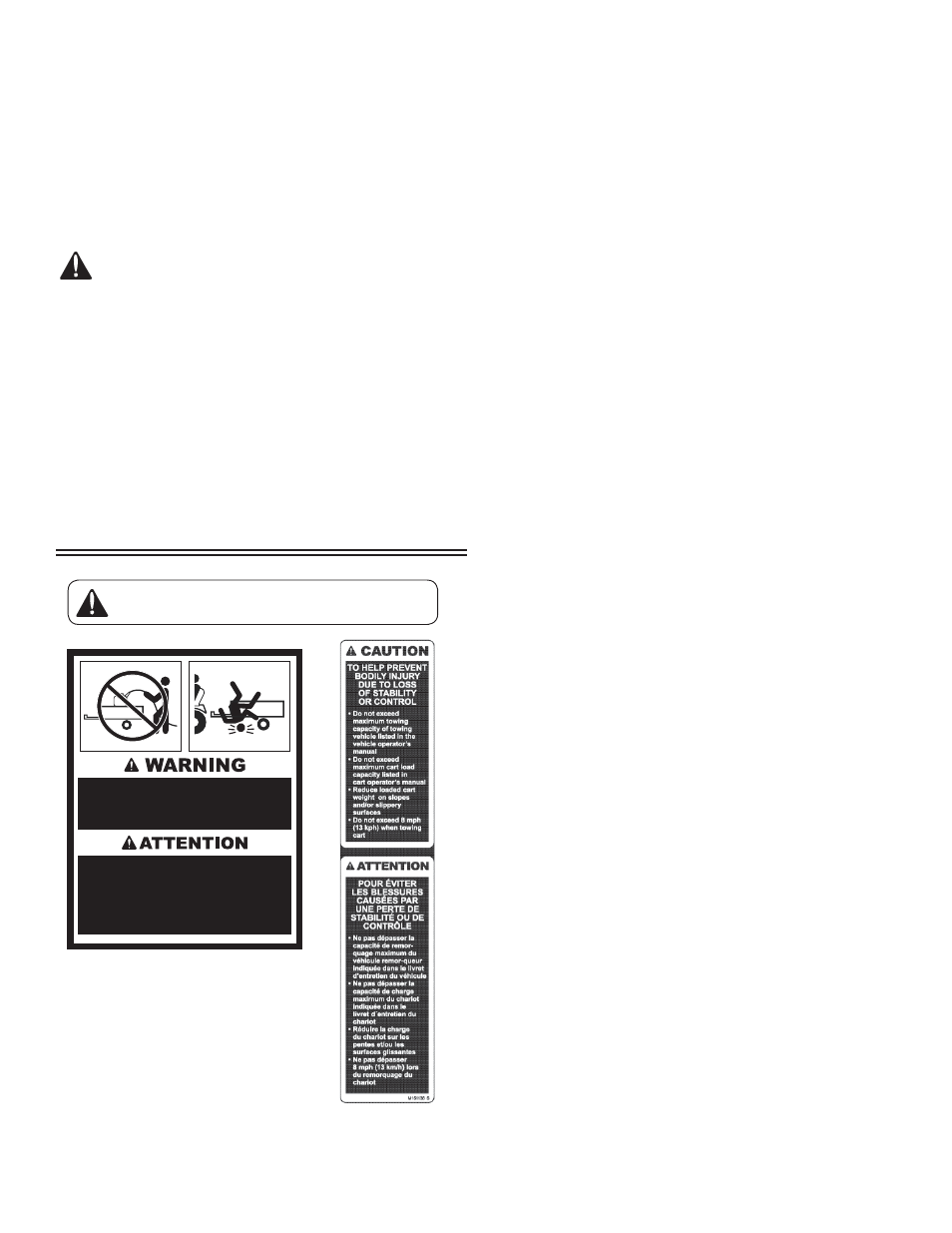Introduction and safety – Brinly 175LTD Cu. Ft. Utility Cart User Manual
Page 2

1009684 - A
2.
CONGRATULATIONS on the purchase of your new Brinly-Hardy
Cart! Your Cart has been designed, engineered and manufactured
to give you the best possible dependability and performance.
Should you experience any problem you cannot easily remedy,
please do not hesitate to contact our knowledgeable customer ser-
vice department toll-free at 1-877-728-8224. We have competent,
well trained technicians to help you with the assembly and use of
your Cart.
CUSTOMER
RESPONSIBILITIES
Please read and retain this manual. The instructions will
enable to assemble and maintain your Cart properly.
Please carefully read and observe the SAFETY section of
this manual.
Follow a regular schedule in maintaining and caring-for
your Brinly-Hardy Cart.
TABLE OF CONTENTS
SAFETY ...........................................................................................2
COMPONENT VIEW AND REFERENCE LIST ...............................4
ASSEMBLY ................................................................................. 5-7
OPERATION ....................................................................................8
SERVICE - STORAGE ....................................................................8
WARRANTY INFORMATION ..........................................................9
SAFETY
SAFETY LABELS AND NOTATION
INTRODUCTION AND SAFETY
================================================================================================
This symbol will help to point out important safety precautions
throughout this manual. It means - ATTENTION! BECOME
ALERT! your safety is involved.
AVOID INJURY FROM EXPLOSION
'RQRWSODFHJDVFRQWDLQHULQFDUWZKHQILOOLQJ
RIDERS CAN FALL OFF AND BE KILLED
1RULGHUVLQFDUW
POUR ÉVITER TOUTE BLESSURE PAR SUITE
D’EXPLOSION
1HSDVFRQVHUYHUOHELGRQiHVVHQFHGDQVOH
FKDULRWORUVGXUHPSOLVVDJH
LES PASSAGERS PEUVENT TOMBER ET
ENCOURIR DES BLESSURES MORTELLES
1HSDVWUDQVSRUWHUGHSHUVRQQHVGDQVOHFKDULRW
B-7084
The safety labels shown in this section are placed in important
areas on your product to draw attention to potential safety haz-
ards.
On your product safety labels, the words DANGER, WARNING
and CAUTION are used with the safety-alert symbol. DANGER
identifi es the most serious hazards.
The operator’s manual also explains any potential safety haz-
ards whenever necessary in special safety messages that are
identifi ed with the word, CAUTION, and the safety-alert symbol.
GENERAL NOTES (OPERATION)
Caution should be taken when towing and/or using any
attachment. This attachment combined with the weight
distribution, turning radius, and speed of towing vehicle can
result in severe injury or death to operator, damage to towing
vehicle, and/or attachment if not used properly. Follow all towing
safety precautions noted in the towing vehicle owner’s manual,
including the following precautions:
•
Ensure the combined weight of the towing vehicle (tow
vehicle weight + operator weight) is greater than the
maximum towed weight of attachment (empty
attachment weight + weight of load).
•
Do not exceed maximum towing capacity of towing
vehicle.
•
Do not exceed the maximum drawbar pull rating of the
towing vehicle. Drawbar pull is the horizontal force
required to pull the attachment (including weight of
load).
•
Only tow this product in the vehicle’s tow mode/speed
setting or less than 5 mph. Do not exceed 5 mph.
•
Towing speed should always be slow enough to
maintain control. Travel slowly and use caution when
traveling over rough terrain. Avoid holes, rocks and
roots.
•
Slow down before you turn and do not turn sharply.
•
Use wide turning angles to ensure the attachment
follows the path of the towing vehicle.
•
Do not use attachment on steep slopes. A heavy
load could cause loss of control or overturn attachment
and towing vehicle. Additional weights may need to
be added to your vehicle; check with
towing vehicle manufacturer for recommendations.
•
Reduce towed weight when operating on slopes.
•
Keep all movement on slopes slow and gradual. Do
not make sudden changes in speed, directions, or
turning.
•
If you start and stop suddenly on hills, you may lose
steering control or the towing vehicle may tip.
Do not start or stop suddenly when going uphill or
downhill. Avoid uphill starts.
•
Slow down and use extra care on hillsides. Turf
conditions can affect vehicle stability. Use
extreme caution while operating near drop-offs.
•
Do not drive close to creeks, ditches and public
highways.
•
Watch out for traffi c when crossing near roadways.
•
Use care when loading or unloading the vehicle into a
trailer or truck.
•
The attachment can obstruct the view to the rear. Use
extra care when operating in reverse.
•
When reversing, carefully back-up straight to avoid
jackknifi ng. Do not allow towing vehicle wheels to
